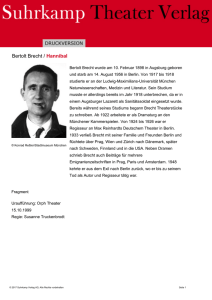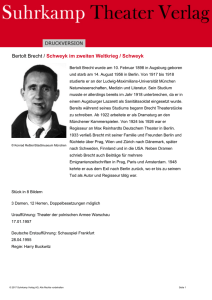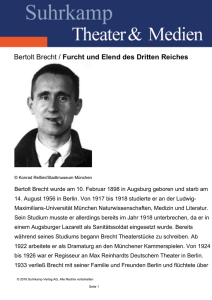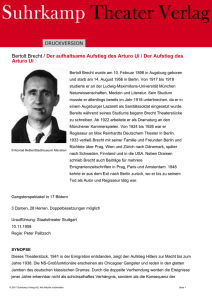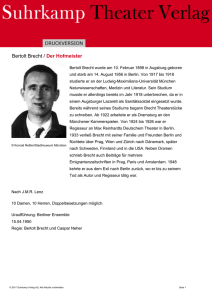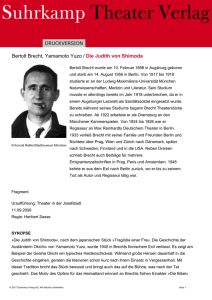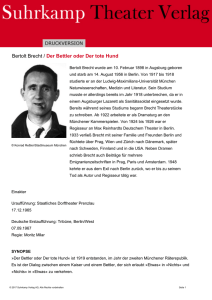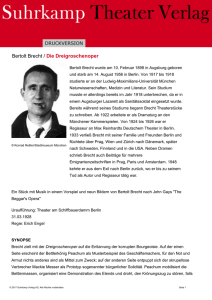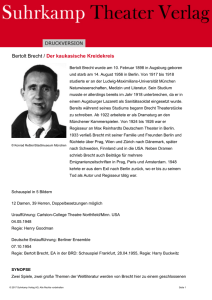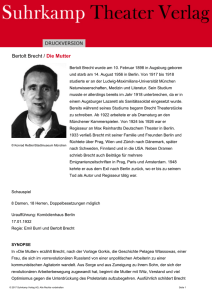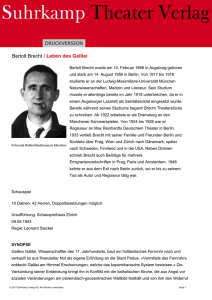1898: 1917-1921 - Drama @ PHOENIX P-12
Werbung
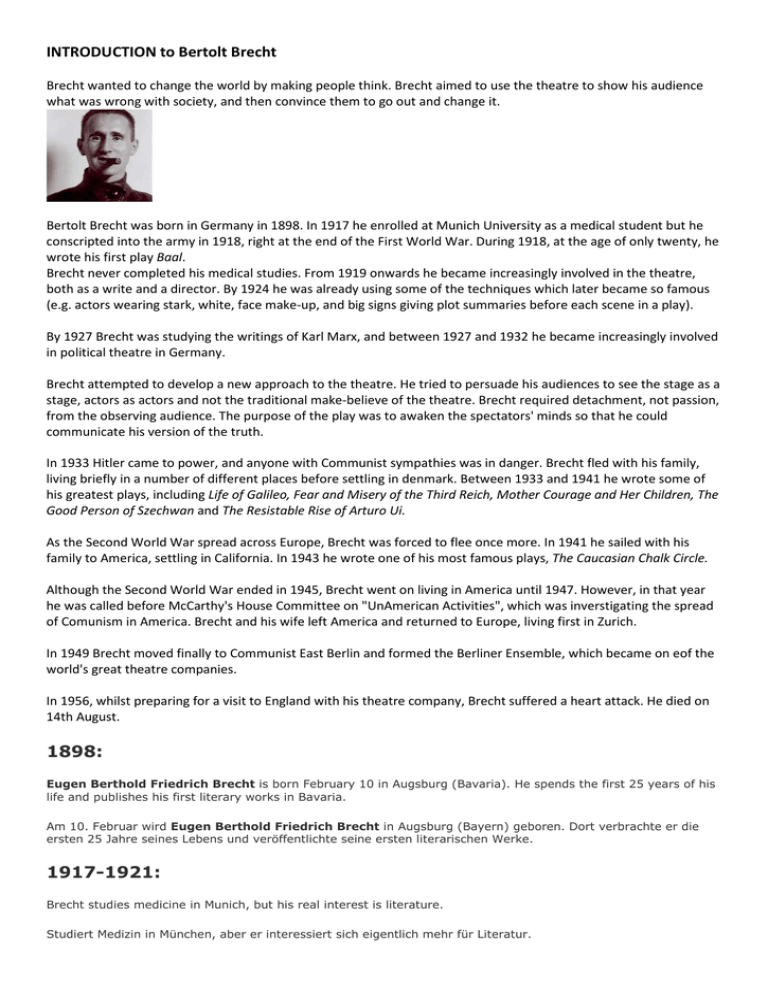
INTRODUCTION to Bertolt Brecht Brecht wanted to change the world by making people think. Brecht aimed to use the theatre to show his audience what was wrong with society, and then convince them to go out and change it. Bertolt Brecht was born in Germany in 1898. In 1917 he enrolled at Munich University as a medical student but he conscripted into the army in 1918, right at the end of the First World War. During 1918, at the age of only twenty, he wrote his first play Baal. Brecht never completed his medical studies. From 1919 onwards he became increasingly involved in the theatre, both as a write and a director. By 1924 he was already using some of the techniques which later became so famous (e.g. actors wearing stark, white, face make-up, and big signs giving plot summaries before each scene in a play). By 1927 Brecht was studying the writings of Karl Marx, and between 1927 and 1932 he became increasingly involved in political theatre in Germany. Brecht attempted to develop a new approach to the theatre. He tried to persuade his audiences to see the stage as a stage, actors as actors and not the traditional make-believe of the theatre. Brecht required detachment, not passion, from the observing audience. The purpose of the play was to awaken the spectators' minds so that he could communicate his version of the truth. In 1933 Hitler came to power, and anyone with Communist sympathies was in danger. Brecht fled with his family, living briefly in a number of different places before settling in denmark. Between 1933 and 1941 he wrote some of his greatest plays, including Life of Galileo, Fear and Misery of the Third Reich, Mother Courage and Her Children, The Good Person of Szechwan and The Resistable Rise of Arturo Ui. As the Second World War spread across Europe, Brecht was forced to flee once more. In 1941 he sailed with his family to America, settling in California. In 1943 he wrote one of his most famous plays, The Caucasian Chalk Circle. Although the Second World War ended in 1945, Brecht went on living in America until 1947. However, in that year he was called before McCarthy's House Committee on "UnAmerican Activities", which was inverstigating the spread of Comunism in America. Brecht and his wife left America and returned to Europe, living first in Zurich. In 1949 Brecht moved finally to Communist East Berlin and formed the Berliner Ensemble, which became on eof the world's great theatre companies. In 1956, whilst preparing for a visit to England with his theatre company, Brecht suffered a heart attack. He died on 14th August. 1898: Eugen Berthold Friedrich Brecht is born February 10 in Augsburg (Bavaria). He spends the first 25 years of his life and publishes his first literary works in Bavaria. Am 10. Februar wird Eugen Berthold Friedrich Brecht in Augsburg (Bayern) geboren. Dort verbrachte er die ersten 25 Jahre seines Lebens und veröffentlichte seine ersten literarischen Werke. 1917-1921: Brecht studies medicine in Munich, but his real interest is literature. Studiert Medizin in München, aber er interessiert sich eigentlich mehr für Literatur. 1922: Marries opera singer Marianne Zoff. They have a daughter together. Between 1919 and 1926 Brecht fathers three children with three different women, only one of whom is his wife. Heirat mit der Opernsängerin Marianne Zoff. Aus der Ehe geht eine Tochter hervor. Zwischen 1919 und 1926 zeugt Brecht drei Kinder mit drei verschieden Frauen, aber nur eine davon ist seine Ehefrau. 1924: Moves to Berlin, where he works briefly with stage directors Max Reinhardt and Erwin Piscator, as well as the playwright Carl Zuckmayer. Umzug nach Berlin, wo er kurz mit den Regisseuren Max Reinhardt und Erwin Piscator, sowie dem Dramatisten Carl Zuckmayer zusammenarbeitet. 1928: A complete revision of the "Beggar's Opera" in collaboration with the composer Kurt Weill. The Dreigroschenoper (Threepenny Opera) has its premiere at the Theater am Schiffbauerdamm in Berlin, with great success. Gemeinsam mit dem Komponisten Kurt Weill Bearbeitung der "Beggar's Opera". Völlige Umgestaltung des Stücks, das als Die Dreigroschenoper im Theater am Schiffbauerdamm in Berlin mit großem Erfolg uraufgeführt wird. 1929: Marries Helene Weigel (10 April) with whom he has another child. The two already have a son born three years earlier. 10. April: Heirat mit Weigel, mit der er ein weiteres Kind hat. Die beiden haben schon einen Sohn, der vor drei Jahren geboren wurde. 1930-1931: 1930: The premiere of the opera Aufstieg und Fall der Stadt Mahagonny ends as a theatrical scandal. 1931: Premiere of the film version of Dreigroschenoper. 1930: Die Uraufführung der Oper "Aufstieg und Fall der Stadt Mahagonny" in Leipzig endet als Theaterskandal. 1931: Uraufführung des Films "Die Dreigroschenoper". 1933: Brecht leaves Germany with his family one day after the Reichstag fire. His exile begins in Prague and ends in the USA, where he works for a time in Hollywood (1945-1947). WEB > Glücksgott (Gedicht und Geschenk an Fritz Lang) Einen Tag nach dem Reichstagsbrand verläßt Brecht mit seiner Familie Deutschland. Sein Exil beginnt in Prag und endet schließlich in den USA, wo er auch in Hollywood arbeitet (1945-1947). WEB > Glücksgott (Gedicht und Geschenk an Fritz Lang) 1947-1956: 30 October 1947: Leaves the U.S. on the same day he is interrogated about his Marxist views by HUAC. 1949: Leaves Zurich for East Berlin, where he founds the Berliner Ensemble. 14 August 1956: Brecht dies of a heart attack in East Berlin. 30. Oktober 1947: Verläßt die USA am gleichen Tag, an dem er durch HUAC über seinen Marxismus gefragt wird. 1949: Übersiedlung von Zürich nach Berlin, wo er das Berliner Ensemble gründet. 14. August 1956: Brecht stirbt in Ost-Berlin an einer Herzinfarkt. Brecht's Life and Works: Today Brecht is best known as a poet, and most critics consider his poetic talent his strong point. His plays were mostly based on the works of others. (Brecht's "Threepenny Opera" is based on John Gay's "Beggar's Opera," while "Edward II" is based on Marlowe.) But he was an innovator with his theatrical "Verfremdungseffekt" ("alienation effect"), designed to make the audience active, thinking participants in a play, rather than just passive observers who get lost in dramatic illusion. Many people today know Brecht best through the "Threepenny Opera" songs he wrote with the composer Kurt Weill ("Mackie Messer"/"Mack the Knife"). Like many artists, Brecht has become more appreciated after his death than he was during his lifetime. His sardonic humor now seems almost contemporary. Born into a bourgeois family with a Catholic father and a Protestant mother, Brecht became a Marxist who was critical of society and religion in general. Forced into exile by the Nazis in 1933, Brecht was a man without a country for much of his life. He seemed to live in his own "alienation effect." Even after his return to East Germany in 1949, Brecht went from being viewed as a radical Marxist in the West, to being viewed suspiciously by the East for his unorthodox dramatic theories. For a brief time Brecht worked in Hollywood—a place he did not like very much. With the Austrian director Fritz Lang, Brecht wrote the script for "Hangmen Also Die" (1943), inspired by the assassination of Reinhard Heydrich by Czech resistance fighters, and the ensuing retaliation by the Nazis. Forced out of Hollywood by HUAC, Brecht finally settled in East Berlin where he died in 1956.
